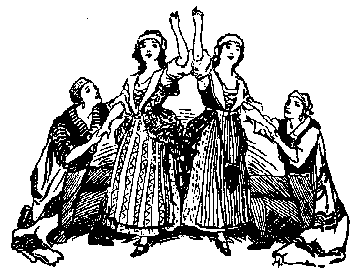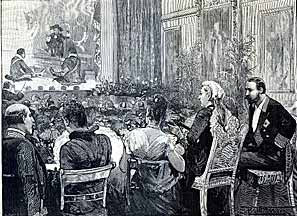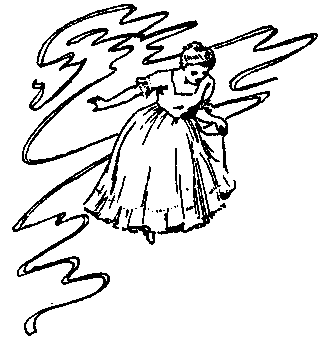Gilbert & Sullivan Opera
A History and a Comment
by H. M. Walbrook
CHAPTER XIV.
QUEEN VICTORIA AND “THE GONDOLIERS.”

In the spring of 1891 the English and particularly the London public saw a great deal of Queen Victoria. She presided over the Royal drawing-rooms at Buckingham Palace; she went down to Portsmouth to launch battleships and honour a brilliant company with her presence at lunch; she drove out to Islington amid roaring crowds to pay a visit to the Horse Show; and in the March of that year she took a step that carried her still farther. She commanded a theatrical performance at Windsor Castle. The "theatre" on this occasion was the noble Waterloo Chamber, and the piece thus honoured was The Gondoliers. The special performance of The Bells, in which Her Majesty had seen Irving two years before, had taken place at Sandringham by desire of the Prince and Princess of Wales.
In March, 1891, the widowed Empress Frederick was staying with the Queen on a visit, and although the importunities of three other of her children, the Prince of Wales, the Duke of Edinburgh and Princess Beatrice, were popularly credited with having persuaded the Queen to this departure, it was probably mainly with the object of giving pleasure to her bereaved daughter that the performance was commanded.
A special train from Paddington took down the entire company and orchestra, 170 persons in all, and they arrived at the Castle in time to have a dress-rehearsal of part of the opera on the improvised stage, which began at 5 o'clock and was not over until after seven. One of the little group of persons who watched this rehearsal was Dr. Randall Davidson, at, that time Bishop-Designate of Rochester, and destined afterwards to succeed Dr. Temple in the Archbishopric of Canterbury. One would rather like to have seen his expression as he listened to the Grand Inquisitor solemnly advising the Dual Monarchs of Barataria that there would be perfect seemliness in a Lord Chancellor playing leapfrog with an Archbishop if they both so desired.

At nine o'clock the performance commenced. The Queen sat in an armchair with a small round table beside it on which lay the book of words, the score, and a pair of opera-glasses. Near her sat the Empress Frederick and a large party of the Royal Family, and behind, on rows of raised seats, stretched a company of invited guests numbering about two hundred. Between the Queen and the orchestra was a broad bed of flowers and evergreens; every light in the noble hall shed its glow, and altogether it may be said that the portraits of Wellington and Blucher on the lofty walls looked down upon a very brilliant scene indeed.
Never did the opera have a better listener than Her Majesty. Again and again her laughter and applause led those of the courtly audience, and several times the people on the stage noticed that the Sovereign was sympathetically tapping the tempo of the gayer concerted numbers with her fan. Perhaps some of those present went back on "imagination's airy wing" three hundred years and pictured the Tudor Queen sitting in her palace watching the performance of a play by Shakespeare, and listening to some such superb compliment as the "fair vestal throned by the west"— and then turned to the black-robed lady in the arm-chair, the revered and beloved Mistress of the same Old England and of an incomparably vaster Empire beyond the seas, as she sat laughing at Gilbert's pleasantries at the expense of two Monarchs! Had ever in recorded history a Sovereign of England sat in her Castle Hall surrounded by Royal relatives and a Royal Household, listening to such words as —
- Oh, philosophers may sing
- Of the troubles of a King;
- Yet the duties are delightful, and the privileges great;
- But the privilege and pleasure
- That we treasure beyond measure
- Is to run on little errands for the Ministers of State!
and enjoying them to the full! And the Empress Frederick — fresh from the solemn and arrogant pretensions of her son on the throne, and from the hard, narrow etiquette of the Prussian Court — how she, too, with her bright and witty intelligence and her English love of fun, must have enjoyed it all!
At half-past eleven the performance concluded, and the Queen, having bowed low to the upstanding guests, retired. At midnight the theatre company and musicians sat down to supper in the Vandyke Room, and at one in the morning another special train conveyed them back from Windsor to Paddington, and an occasion that was to be remembered to the end of their lives was a part of history.
The only sad element in this famous event is that it did not take place in the theatre itself and in the presence of the audience that would have gathered, not only to hear The Gondoliers, but to see the Queen, to whom the nation was so devoted, "at the play." I remember Her Majesty coming to London to bear one of Gounod's oratorios at the Albert Hall, and shall never forget the mystical stillness of the vast upstanding audience as the little old lady entered her box, and, having bowed very low three times, with the beautiful dignity and courtesy of which she was such a mistress, took her seat. What a pleasure it would have been to see that all happen in a theatre, in such a theatre as the Savoy, and upon so joyous an occasion as a performance of The Gondoliers. And what a scene there would have been in the Strand as Her Majesty drove by on her way to the theatre!
I remember that on the opening night of what is now the Palace Theatre, a rumour got abroad that the Queen intended being present at the first performance of Ivanhoe. One result of this was that for more than an hour before the theatre opened its doors, the pavements of Shaftesbury Avenue, from Piccadilly Circus to the theatre, were packed with people to see the Queen pass. Her Majesty sent a message of good wishes for the success of the evening, but did not attend the premiere in person.
